
The variable seedeater is a passerine bird which breeds from southern Mexico through Central America to the Chocó of northwestern South America. The taxonomy is confusing, and it was formerly considered a subspecies of Sporophila americana. Even within the variable seedeater as presently defined, there are great variations in plumage.

The cinnamon-rumped seedeater is a passerine bird in the typical seedeater genus Sporophila.

The black-billed seed finch is a species of bird in the family Thraupidae. It is found in the western Amazon Basin.
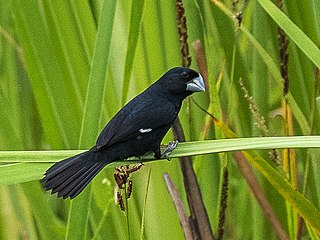
The large-billed seed finch is a species of bird in the family Thraupidae.

The thick-billed seed finch is a species of bird in the family Thraupidae, but was until recently placed in Emberizidae. It is found widely in shrubby and grassy areas from southern Mexico, through Central America, to the Chocó in Colombia and Ecuador. It is replaced by the closely related chestnut-bellied seed finch in South America east of the Andes, as well as the valleys of Cauca and Magdalena in Colombia. The two have often been considered conspecific as the lesser seed-finch.

The Nicaraguan seed finch is a species of bird in the family Thraupidae. It is found in Costa Rica, Nicaragua and northwestern Panama.
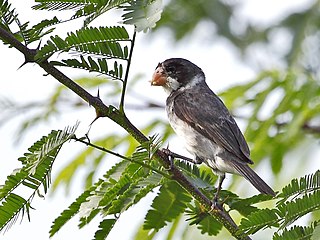
The white-throated seedeater is a species of bird in the family Thraupidae. It is endemic to northeastern Brazil.

The copper seedeater is a species of bird in the family Thraupidae. It was lumped with the pearly-bellied seedeater, and known together as the capped seedeater before being split in February 2012.

Lesson's seedeater is a bird species in the family Thraupidae.

The chestnut-bellied seedeater is a species of bird in the family Thraupidae. It is found in Bolivia, Brazil, Colombia, Ecuador, French Guiana, Guyana, Peru, Suriname, and Venezuela. Its natural habitats are subtropical or tropical moist shrubland and heavily degraded former forest.

The grey seedeater is a species of bird in the family Thraupidae. It is found in Brazil, Colombia, Ecuador, Guyana, Trinidad and Tobago, and Venezuela. Its natural habitats are subtropical or tropical seasonally wet or flooded lowland grassland and heavily degraded former forest.

The white-bellied seedeater is a species of bird in the family Thraupidae. It is found mainly in Bolivia, Paraguay and eastern Brazil, with smaller numbers in Suriname, southeastern Peru and northern Argentina. Its natural habitats are subtropical or tropical moist shrubland, swamps, and heavily degraded former forest.

The black-and-white seedeater is a species of bird in the family Thraupidae. It is found in Bolivia, Brazil, Colombia, Ecuador, Peru, and Venezuela. Its natural habitats are subtropical or tropical moist shrubland, subtropical or tropical high-altitude shrubland, and heavily degraded former forest.

The ruddy-breasted seedeater is a species of bird in the tanager family Thraupidae. It is found in Brazil, Colombia, Costa Rica, Ecuador, El Salvador, French Guiana, Guatemala, Guyana, Honduras, Mexico, Nicaragua, Panama, Suriname, Trinidad and Tobago, and Venezuela. Its natural habitats are dry savanna, subtropical or tropical seasonally wet or flooded lowland grassland, and heavily degraded former forest.

The yellow-bellied seedeater is a species of bird in the family Thraupidae, formerly placed with the American sparrows in the Emberizidae.
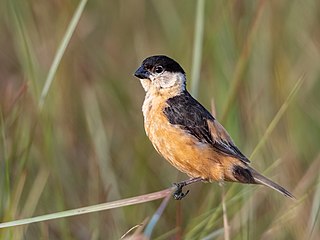
The black-and-tawny seedeater is a species of bird in the family Thraupidae.
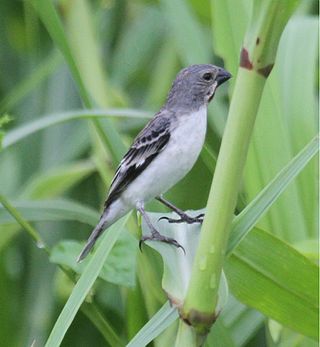
The chestnut-throated seedeater is Neotropical songbird in the family Thraupidae.

The wing-barred seedeater is a passerine bird from coastal regions of north-eastern South America in north-eastern Venezuela, Tobago, the Guianas, Amapá and north-eastern Pará, Brazil, and along the Amazon River upstream to around Manaus. Formerly, it included the mainly Central American Sporophila corvina and the west Amazonian S. murallae as subspecies, in which case the combined species had the common name Variable Seedeater. Following the split, this common name is now restricted to S. corvina.
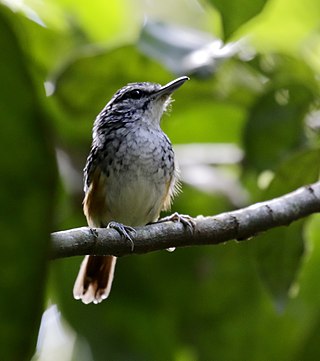
The Peruvian warbling antbird is a species of bird in the family Thamnophilidae. It was considered a subspecies of Hypocnemis cantator, but based on vocal differences and to a lesser degree differences in plumages, it has been recommended that they be treated as separate species. As presently defined, the Peruvian warbling antbird includes a single subspecies, saturata. It has a black, white, and grey head and breast, with rufous flanks and a dull brown lower back and tail.

Morelet's seedeater is a passerine bird in the typical seedeater genus Sporophila.























